
When It Occurs
Every April 2nd
Timeline
Days Passed (1057)
# Hashtags
#InternationalFactCheckingDay #CheckTheSource
April 2nd marks the celebration of International Fact-Checking Day, a worldwide initiative emphasizing the significance of precise information in the contemporary era. On this occasion, media organizations actively participate in bolstering fact-checking resources. Fact checkers play a crucial role in ensuring the accuracy and fair representation of all facts and claims within a story. The day also advocates for the dissemination of accurate information across various domains, including current affairs, journalism, public health, and everyday life.
Origins and History
- Founded by: The International Fact-Checking Network (IFCN) at the Poynter Institute and other fact-checking organizations.
- Purpose: To raise awareness about the importance of accurate information, encourage critical thinking, and promote media literacy.
Significance
- Combatting Misinformation: Highlighting the need to verify facts to combat the spread of false information and rumors.
- Media Literacy: Educating the public on how to critically evaluate news sources and distinguish between accurate and misleading information.
- Supporting Fact-Checkers: Recognizing the crucial role of fact-checkers in the media ecosystem and supporting their work.
Typical Activities
- Workshops and Seminars: Organizing educational sessions on fact-checking, media literacy, and critical thinking.
- Public Awareness Campaigns: Running campaigns on social media and other platforms to spread awareness about the importance of fact-checking.
- Collaborative Fact-Checking: Encouraging collaboration among fact-checking organizations, journalists, and the public to verify information.
- Educational Resources: Providing resources such as guides, toolkits, and online courses to help people improve their fact-checking skills.
- Engaging with Media: Fact-checking organizations engage with media outlets to promote accurate reporting and responsible journalism.
Key Messages
- Verify Before Sharing: Emphasizing the importance of verifying information before sharing it, especially on social media.
- Critical Thinking: Encouraging individuals to think critically about the information they consume and to question the sources.
- Support for Fact-Checkers: Highlighting the work of fact-checkers and the challenges they face in the fight against misinformation.
How to Fact-Check
- Check the Source: Verify the credibility of the source. Look for reputable and established news outlets.
- Cross-Reference Information: Compare the information with multiple reliable sources to see if it is consistently reported.
- Look for Evidence: Seek out original documents, data, or eyewitness accounts that support the claims being made.
- Check the Date: Ensure the information is current and not outdated.
- Use Fact-Checking Websites: Utilize dedicated fact-checking websites such as Snopes, FactCheck.org, and PolitiFact.
Fact-Checking Organizations
- International Fact-Checking Network (IFCN): A global network of fact-checking organizations that sets standards and promotes best practices in fact-checking.
- Snopes: One of the oldest and most well-known fact-checking websites.
- FactCheck.org: A nonpartisan organization that monitors the factual accuracy of statements by major U.S. political players.
- PolitiFact: A fact-checking website that rates the accuracy of claims made by elected officials and others in American politics.
- Full Fact: A UK-based independent fact-checking charity that provides accurate information on various topics.
Global Observances
- United States: Fact-checking organizations, educational institutions, and media outlets participate in raising awareness about the importance of accurate information.
- United Kingdom: Similar activities are organized to promote media literacy and critical thinking.
- Canada: Fact-checking initiatives and educational campaigns are conducted to combat misinformation.
- Australia: Media outlets and fact-checking organizations engage in public awareness campaigns and educational activities.
- Other Countries: International Fact-Checking Day is recognized globally, with various countries participating in different ways to promote fact-checking and media literacy.
Challenges in Fact-Checking
- Volume of Information: The sheer volume of information, especially on social media, makes fact-checking a daunting task.
- Speed of Misinformation: Misinformation can spread rapidly, often outpacing efforts to verify and correct it.
- Public Trust: Gaining and maintaining public trust in fact-checking organizations is crucial yet challenging.
- Resource Constraints: Fact-checking organizations often operate with limited resources and face financial challenges.
Conclusion
International Fact-Checking Day is a vital observance that underscores the importance of accurate information and the need to combat misinformation. By promoting media literacy, encouraging critical thinking, and supporting the work of fact-checkers, this day aims to foster a more informed and discerning public. Celebrating this day involves educational activities, public awareness campaigns, and collaborative efforts to verify information, ultimately contributing to a healthier and more reliable information ecosystem.


